In continuation of my Part 1 analysis of the recently issued Delhi Liquor Policy 2021-22, which can be seen here in all its pride, glory and obeisance to imperial measures going back to over half-a-century ago (India went metric, mandatorily, 1958-1962 but this Delhi Government still refers to “quarts”), one jumps to the fine print at the bottom of the whole exercise.
5.1.(ii) says – ” The bars in Hotels, Restaurants and Clubs are allowed to operate till 03:00 A.M. except those licensees which have been given license to operate round the clock service of liquor”. It then goes on to state – at 5.1.(xii) “The HCR licensees are permitted to play any type of entertainment/performance including music and musical instruments, dancing, or singing by professionals or DJ, Live Bands, and Karaoke on its premises”
This is further clarified here at 5.1. (i) – Licensees of HCR shall be allowed to serve any Indian Liquor and Foreign Liquor in any area within the licensed premises, including open spaces viz. terrace / balcony / lower area of licensed premises with the condition that the liquor serving area shall be screened off from the public view.
Luckily we have sound pollution and FSSAI regulations on what can be done, what can be served, and how it can be served. But “professional” dancers till 3am? You have been adequately informed. Dance bars, here they come, it seems – and all that goes with it.
xxx
The real issue that I foresee with the Delhi Liquor Policy is that the intermediary wholesaler, also known as L-1 licencee, shall have the sole right to deal with the manufacturers on one side and the retailers on the other. The price setting mechanism, wholesale as well as retail, is also not very clear. The brand and label registration by the manufacturer has been kept very high (1 lakh per brand) and that in turn will make new brands trying to sell in Delhi think twice, as they shall also have to meet stringent conditions on sales elsewhere in India.
Globally, manufacturers are allowed to set up their own manufacturer operated outlets, as well as compete with other brands in the open market. That provides a buyer the comfort level of opting for a choice. That also provides new entrants with an option to try to enter a market. There is also the option of online sales, which is where all of India’s success stories in consumer goods have been written on, lately. Here we will now have wholesalers – what value they add is unknown as of now.
Now we come to the healthier type of alcoholic beverages. Not just the hard stuff. What we as Indians consumed before the Colonials forced hard liquor down our throats and destroyed our ancient traditions of wine from locally sourced options like fruits and flowers and even molasses. Luckily for us, FSSAI has revived them.
The health benefits of low-alcohol content beverages, defined by FSSAI now as those that have between 0.5% and 8% V/v of alcohol, can not be ignored also. Likewise, good traditional Indian fruit and flower wines, which are entering the market and consumer’s homes all over the rest of India, are visible to all – and to shift this category to “country liquor” appears to be a mixed blessing. I, for one, would be very proud to drink my Indian “country liquor” made in traditional ways in India – and I am not alone. Diplomats and foreign visitors have lately been seeking out toddy (palm wine), feni (cashew and coconut wine), fruit wines of all sorts (pineapple, mulberry, peach, strawberry, mango, and any more) flower wines (mahua, rhododendron).
That these are not made available to us in Delhi because of this Delhi Liquor Policy 2021-2022, needs to be reviewed – after all, a good Rhododendron Wine from HPMC at 250/- Rupees for a large bottle of 650 ml, or kiwi wine from Arunachal Pradesh at not much higher, would not just boost the complete Atmanirbhar aspect of fruit farming in India – but would also reduce wastage and spoilage of the fruit that has already fallen down on the ground in India. With climate change and strong winds as well as unseasonal weather, to have a Liquor Policy that appears to provide an easy time to import doubtful plonk while making it difficult for our own products, appears to be very foolish at the least. And downright anti-National on the other end of the scale.
Globally, countries promote their own products, but here in this “policy”?
And one big reason for this is the way the wholesale prices are being calculated. The domestic manufacturer has to provide all sorts of calculations and justifications for the ex-Distillery or Winery/Wineyard price and then a fixed amount provided for transport to Delhi, while the imported plonk is taken at face value on CIF basis. The domestic manufacturer has to also assure year-round supply – can mango wine be supplied all through the year, to give just one example?
Putting it bluntly – the Delhi Liquor Policy is stacked against the upcoming domestic manufacturers. And the Citizen/Customer appears to have no say in the matter – except tolerate dance bars till 3 in the morning.
Veeresh Malik was a seafarer. And a lot more besides. A decade in facial biometrics, which took him into the world of finance, gaming, preventive defence and money laundering before the subliminal mind management technology blew his brains out. His romance with the media endures since 1994, duly responded by Outlook, among others.
A survivor of two brain-strokes, triggered by a ship explosion in the 70s, Veeresh moved beyond fear decades ago.


